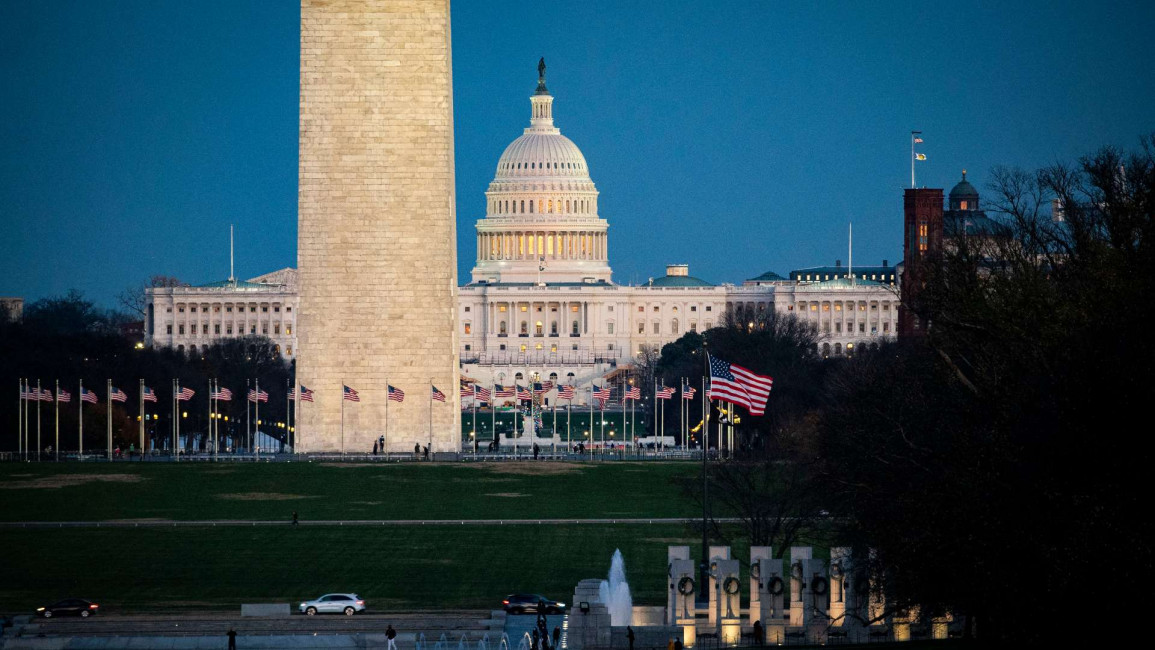US lawmakers seek to block Saudi Arabia from acquiring nuclear weapons
US lawmakers seek to block Saudi Arabia from acquiring nuclear weapons
The Democratic lawmakers say they want to 'extinguish any future Middle East arms race'.
2 min read
The act could prompt Washington to restrict arms sales to Saudi Arabia [Getty]
Democratic lawmakers this week introduced a bill that seeks to block Saudi Arabia from acquiring nuclear weapons capabilities in the future.
The Stopping Activities Underpinning Development in Weapons of Mass Destruction (SAUDI WMD) Act would ask the US president to impose sanctions on foreign nationals or countries thought to have sold sensitive missile technologies to Riyadh.
It would also force Washington to block most arms sales to Saudi Arabia if the kingdom "does not take steps to show the world that its nuclear programme will remain exclusively peaceful".
The bill was first drafted in response to reports last year that Saudi Arabia was collaborating with China to build a ballistic missile production facility and to expand its nuclear programme beyond International Atomic Energy Agency (IAEA) safeguards.
"We must take seriously Saudi Crown Prince Mohammad bin Salman's pledge that the Kingdom will seek a nuclear weapon if Iran develops a bomb of its own," said Senator Edward Markey, who forwarded the bill alongside Senator Jeff Merkley and Congressmen Joaquin Castro and Ted Liu.
"The uncertain fate of the Iran Nuclear Deal combined with ample, concerning press reporting that Saudi Arabia may have illegally acquired items related to a program to build nuclear-capable missiles, calls for a diplomatic offensive led by the United States to extinguish any future Middle East arms race," Markey said.
A "nuclear-capable Saudi Arabia would directly undermine US interests and the international goal of promoting nuclear non-proliferation", said Representative Liu.
Riyadh's expansion of its nuclear programme in partnership with China has been a growing concern for the US.
The diversification of energy sources is key to Crown Prince Mohammed bin Salman's Vision 2030, which aims to wean the kingdom off its dependency on oil.
Reports indicate that Riyadh has made steps towards the development of nuclear fuel.
Under the Trump administration, Washington permitted two US companies to share sensitive nuclear power information with Saudi Arabia.
The authorisations were granted shortly after the killing of journalist Jamal Khasshogi, a US resident, in the Saudi consulate in Istanbul in October 2018.
The Stopping Activities Underpinning Development in Weapons of Mass Destruction (SAUDI WMD) Act would ask the US president to impose sanctions on foreign nationals or countries thought to have sold sensitive missile technologies to Riyadh.
It would also force Washington to block most arms sales to Saudi Arabia if the kingdom "does not take steps to show the world that its nuclear programme will remain exclusively peaceful".
The bill was first drafted in response to reports last year that Saudi Arabia was collaborating with China to build a ballistic missile production facility and to expand its nuclear programme beyond International Atomic Energy Agency (IAEA) safeguards.
"We must take seriously Saudi Crown Prince Mohammad bin Salman's pledge that the Kingdom will seek a nuclear weapon if Iran develops a bomb of its own," said Senator Edward Markey, who forwarded the bill alongside Senator Jeff Merkley and Congressmen Joaquin Castro and Ted Liu.
"The uncertain fate of the Iran Nuclear Deal combined with ample, concerning press reporting that Saudi Arabia may have illegally acquired items related to a program to build nuclear-capable missiles, calls for a diplomatic offensive led by the United States to extinguish any future Middle East arms race," Markey said.
A "nuclear-capable Saudi Arabia would directly undermine US interests and the international goal of promoting nuclear non-proliferation", said Representative Liu.
Riyadh's expansion of its nuclear programme in partnership with China has been a growing concern for the US.
The diversification of energy sources is key to Crown Prince Mohammed bin Salman's Vision 2030, which aims to wean the kingdom off its dependency on oil.
Reports indicate that Riyadh has made steps towards the development of nuclear fuel.
Under the Trump administration, Washington permitted two US companies to share sensitive nuclear power information with Saudi Arabia.
The authorisations were granted shortly after the killing of journalist Jamal Khasshogi, a US resident, in the Saudi consulate in Istanbul in October 2018.



